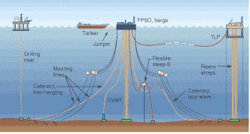The recent surge in deepwater field development, particularly off West Africa, has raised concerns over FPSO/ riser/moorings interaction. One of the more experienced consultants in this field is Principia, founded in 1981 and currently staffed by a team of hydrodynamics and marine engineering specialists.
Principia, based in La Seyne sur Mer, describes itself as a scientific engineering/R&D company, and is owned jointly by Comex, Doris Engineering, ISIS, and Technicatome. Its traditional customers are spread among the offshore, defense, energy, automotive, and space sectors, although last year it branched into shipbuilding through the formation of Principia Marine in Nantes, co-owned by Alstom Chantiers de l'Atlantique. Additionally, it owns 17% of Oceanide, the test tank facility (see related article in this section).
Offshore-related projects provided 30% of the company's business last year, and the aim is to grow that percentage to 40% within the next five years, as well as increasing turnover from this sector. This could partly be realized through the opening of a new office in Houston. Principia is about to transfer its main office to larger premises at La Ciotat, east of Marseille, to house its growing team of engineers. It also maintains an office in Rueil Malmaison, next door to the Institut Francais du Petrole (IFP) and La Defense (west Paris), where the main French oil companies and offshore contractors are headquartered.
Principia has developed a range of engineering software that includes Eole (computational flow dynamics) and the Diodore hydrodynamic software tool for stability, wave load, sea-keeping, and mooring analysis. It continues to work closely with IFP on the DeepLines suite for global analysis of risers, moorings, and flowlines.
Recently, two new modules were added to DeepLines:
- DeepVIV, developed by IFP, is a vortex-induced vibration (VIV) prediction tool providing, for example, static and modal pre-analysis, VIV fatigue estimate, modified drag co-efficient, and analysis of anti-VIV devices
- DeepDriser is an object-oriented interface to DeepLines, providing drilling riser modeling capability, a user-friendly, self-assembled database of riser joints, plus analyses of sensitivity to mud-specific gravity, rig offset, top tension, and current velocity (including the stresses incurred in connect/disconnect mode).
The two partners are also working on another tool that combines DeepLines with computational flow dynamics (CFD) for mathematical validation purposes.
Offshore projects provided 30% of the company's business last year.
Principia also works with, and sometimes promotes, other companies' software tools such as Abaqus (HKS) for structural mechanics analysis.
West African experience
The company has played a role in the conceptual or design engineering phase of most of the recent projects off West Africa involving deepwater FPSOs or TLPs, including developments in Angola blocks 14, 15, and 17, and the proposed floating production unit for Moho-Bilondo, where it was contracted by Doris for hull scantlings definition and review.
Typically, Principia is requested to compute the probable hydrodynamic forces on the selected hull and associated subsea lines, according to localized currents, and specific subsea equipment/well configurations.
"If the preferred solution is riser towers, a CALM buoy, whatever, we are independent enough to say what the potential troubles might be," says Principia's Offshore Activities Manager Philippe Le Buhan. "We usually factor in metocean data provided by the oil companies. Otherwise, as we are involved in various projects in many regions, we can also recommend suitable data that could be factored in (to optimize development planning)."
Principia can also commission tests with specially instrumented model floaters at the Oceanide, Brest, or other basins to validate its calculations. These can include roll motion and hydroelasticity tests (bending moment) or sloshing (more applicable to LNG tankers). Recently, it started work on a static/dynamic ship stability prediction tool that incorporates the "Melnikov" method for roll analysis. This is a project for the French Navy, although the findings could also be applied to shuttle tankers and drillships, Le Buhan says.
"For FPSOs, we are also looking at deck 'wetting,' i.e., the effects of green water ingress. We can change the shape or height of the front of the vessel, depending on the height of the water expected to come on deck. We have also performed tests using computational flow dynamics for wave impact and slamming. Although orientated toward the shipbuilding industry, this could be adapted to floating production systems in certain harsh environments such as offshore China," Le Buhan says.
CFD was recently applied to assess the vertical added mass and drag co-efficients of several subsea packages employed on the Girassol project off Angola. "We needed to identify what was the added mass close to the seabed, due to the associated resonance risk during the installation phase for the riser tower suction anchor, manifold, and associated spools," Le Buhan says. CFD analysis was also used for definition and validation of heave-compensation equipment on the Stolt Offshore vessels engaged in the Girassol installation phase.
For Dalia, the next approved development in block 17 operated by TotalFinaElf, Prinicipia recently assisted in preliminary mooring analysis of this field's FPSO.
Finally, Diodore has also been used to simulate heavy deck installations during floatover operations, i.e., the entry of the barge in the jacket for deck mating. A study has recently been conducted as "third party verification" for TotalFinaElf's Amenam deck installation offshore Nigeria, which will be installed next spring using Technip's Unideck floatover technique.




